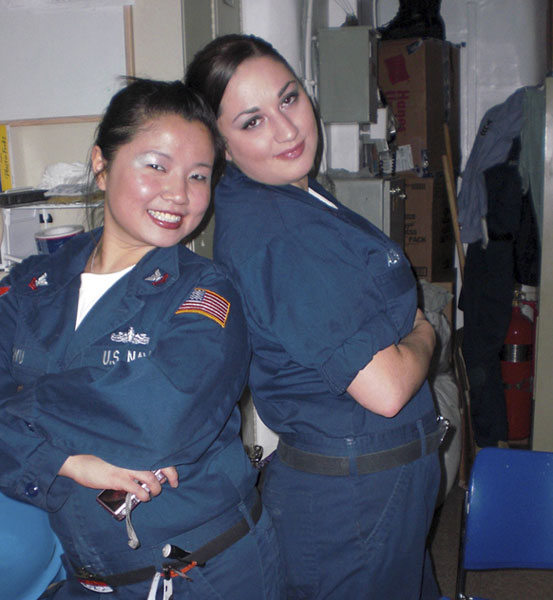

Cindy Wu (left) is one of the Chinese-American soldiers interviewed by Victoria Moy in her latest book "Fighting For the Dream: Voices of Chinese American Veterans from World War II to Afghanistan." Wu served in the Navy during the Iraq War. Photo provided to China Daily
One interview Moy did was with veteran Lester Fong, who came from China at the age of 15 and was not content that he could only find work either in laundromats or Chinese restaurants. He ended up working at a sportswear factory, learning the skills of the trade and eventually opening his own factory where he then began making military uniforms for the US Army.
Fong was drafted into the army and sent to Guam, where he witnessed kamikazes. He barely spoke English at the time and the ordeal was frightening to him, Moy recalled.
Another soldier Moy talked to is closer to her in age, someone she had come across while covering an American Legion parade.
"What surprised me in my mid-20s was seeing people coming back from Iraq who were my own age. It was something I didn't really understand. Why would someone from my community choose to go?" she said.
Pakee Fang was in his mid-20s when he met Moy, someone who had immigrated to Chinatown at the age of 10. His family was struggling in America, and his living situation was stressful, Moy said. Fang didn't do very well in school and so joining the military was his way out.
"He said that the first time he went to boot camp was the first time he left Chinatown since he came and it was the first time he realized that he didn't speak English very well, and that he had been speaking Chinglish all along. That was a huge culture shock for him," Moy said.
The military was a great experience for him in the end, and because of all the poverty and hardship Fang saw through his time in the military, he decided not to take anything for granted, she said, and became a 4.0 student after that.
"His life changed. He had a lot more appreciation," she said.
Interviewing Chinese-American veterans and soldiers was an exercise in learning about Chinese-American identity from people who had vastly different life experiences, Moy said.
"Sometimes when I hear these stories, I don't think that our nation went through a linear progression in terms of advancement. I think each generation we go through, we do experience a lot of the same things over and over again, not in a bad way, but it's a reality," she said.
"I think people like to think that people used to be racist and that people are open-minded now. It's not like that. It's much more complicated and I think every generation deals with the ideal of 'Americanness' in different ways. Throughout different generations, I guess you have Chinese Americans who have negotiated being both American and Chinese."
Copyright ©1999-2018
Chinanews.com. All rights reserved.
Reproduction in whole or in part without permission is prohibited.